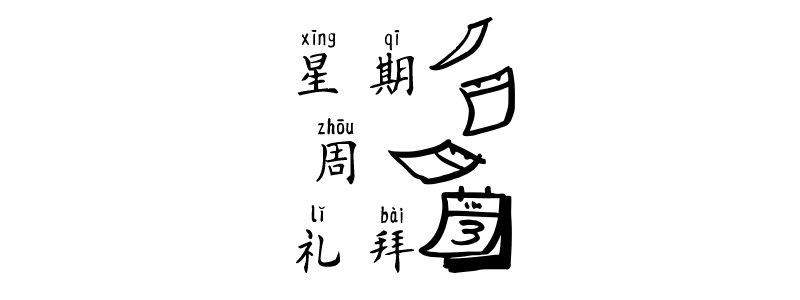Grammar Point:
In Mandarin Chinese, week of days can be expressed in three different ways, which is 星期 xīngqī, 礼拜 lǐbài, and 周 zhōu. All three systems follow a simple pattern and are easy to remember! (In comparison to English😎)
星期 xīngqí/xīngqī
星期 xīngqī literally means “star period” and originally referred to the seven-day planetary cycle in ancient times. It was later adopted to represent “week” in modern Chinese. It is commonly used in both China and Taiwan in spoken language.
禮拜/礼拜 lǐbài
The term 礼拜 lǐbài has historical origins dating back to the 19th century when Western missionaries and traders arrived in China. Originally meaning “worship,” it referred to the Christian or Islamic rituals performed regularly by these individuals. It later extended to represent the seven-day cycle as local Chinese noticed that Westerners worshipped every seven days. This was significant because China previously followed a 10-day cycle known as 旬 xún before adopting the Western-style week. It is more commonly used in spoken language in Taiwan compared to China.
週/周 zhōu
The term 周 zhōu is another commonly used way to express “week” in Chinese. It is derived from the Chinese character meaning “cycle” or “circulation” and is used to denote a period of seven days. (Another variation, 周 zhōu, was derived from the Japanese Kanji “週 (しゅう)”, meaning “cycle,” at the beginning of the 20th century.)
Unlike 礼拜 lǐbài, 周 zhōu does not carry the historical religious connotations and is not associated with Western imperialism. As a result, it is the preferred term in many official and formal contexts, including calendars, schedules, and official documents.
- 星期星期:Spoken, widely use
- 禮拜礼拜:Spoken, less formal, very common in Taiwan
- 週周:Written, formal
Structure
In Mandarin Chinese, days of the week are formed by the word “week” followed by a number: (Sunday is an exception)

💜 星期一星期一
💜 禮拜一礼拜一
💜 週一周一

💚 星期二星期二
💚 禮拜二礼拜二
💚 週二周二

🧡 星期三星期三
🧡 禮拜三礼拜三
🧡 週三周三

💙 星期四星期四
💙 禮拜四礼拜四
💙 週四周四

💛 星期五星期五
💛 禮拜五礼拜五
💛 週五周五

🩵 星期六星期六
🩵 禮拜六礼拜六
🩵 週六周六

❤️ 星期天 or 星期日星期天 or 星期日
❤️ 禮拜天 or 禮拜日礼拜天 or 礼拜日
❤️ 週天 or 週日周天 or 周日
Sunday is the exception when it comes to the naming of days in Chinese. Instead of using “week seven,” it is referred to as “week day”. Both 日 rì and 天 tiān mean “day” in Chinese. 天 tiān sounds more casual in comparison to 日 rì.
星期天你要去爬山嗎?星期天你要去爬山吗?
Are you going hiking on Sunday?
這家咖啡店週一休息这家咖啡店周一休息
This coffee shop is closed on Mondays.
禮拜六你做什麼?礼拜六你做什么?
What are you doing on Saturday?
我上星期一沒上中文課我上星期一没上中文课
I didn’t attend Chinese class last Monday.
他下禮拜日沒時間他下礼拜日没时间
He doesn’t have time next Sunday.
每週三咖啡買一送一每周三咖啡买一送一
Buy one coffee, get one free every Wednesday.
Days in Chinese
- Dates in Chinese (HSK 1)
- Time in Chinese (HSK 1)


